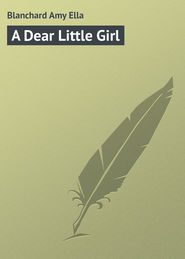По всем вопросам обращайтесь на: info@litportal.ru
(©) 2003-2024.
✖
The Four Corners
Настройки чтения
Размер шрифта
Высота строк
Поля
Jack went out into the hall. She had found something to do for Nan. She tiptoed down-stairs and went out upon the porch softly closing the door behind her and looking toward Uplands. Yes, there hung the red cloth from the second story window. For a moment the child stood irresolute, then she started off, but with more than one backward look. She was doing the same thing as that for which Nan had been punished, but she didn't care. It was for Nan. Nan wanted her Aunt Helen to know that she could not come to her. She remembered that this had distressed her sister in their talk that evening before the imprisonment.
The little girl trudged on downhill, across the brook and uphill, on the other side. In a few minutes she had reached the house and was trying to make up her mind at which door she should knock. She decided upon that which opened upon the front porch and here she raised the brass knocker and let it fall twice. The door was opened by Miss Helen herself. Jack knew her at once from Nan's description, and it may be that Miss Helen guessed Jack's identity for she said: "Come in, dear."
"I can't come in," said Jack. "Nan's tumbled down-stairs and has broken her arm. She can't come to see you and she's dreadful sorry."
"Oh, dear, oh, dear, how grieved I am to hear that!" said Miss Helen. "How did it happen?"
"Aunt Sarah shut her up and wouldn't give her any supper, so she got up in the night and Lady Gray saw a mouse and jumped so the candle went out and Nan fell nearly all the way from the top. It's a wonder she wasn't killed, Cousin Mag says."
Just what Lady Gray had to do with the accident Miss Helen could not clearly understand. "Oh, I am so sorry," she repeated. She hesitated before asking, "Why did Aunt Sarah shut her up?"
Jack did not reply at once. "I don't believe I ought to tell that," she said. Then after some consideration of the subject: "Maybe I can tell half; she shut her up for one thing and she made her go without her supper because Nan sassed her back."
Miss Helen smiled but immediately she said gravely, "Nan should not have done that."
"Maybe you would, too, if you were doing something your mother let you do and your mother's aunt said you shouldn't," returned Jack, feeling that in this rather mixed-up speech she had adequately excused Nan, and Miss Helen read the meaning sufficiently well to take in the fact that Miss Sarah had disapproved of Nan's coming to Uplands.
"Aunt Sarah has written to mother," said Jack, "and Mary Lee has written, too, so I reckon Aunt Sarah will feel awfully sorry when mother's letter comes and says Nan wasn't disobeying." Jack gave further enlightenment. "I see Nan every day," she added.
"I am sure that makes Nan happier," returned Miss Helen. "Which of the twins are you? Jack, I suppose."
"Yes, I am Jack. Jean is over to Cousin Mag's. We sleep there now while Nan is sick. Nan won't be able to write for ever so long, for her right arm is all wrapped up in something and she can't move it. It is funny that it is her right arm and her writing arm, too, isn't it? I must go now."
"I wish you could stay," said Miss Helen wistfully. "I will write to Nan, and you must give her my love. Can't you stay and see your grandmother? She is asleep now, for she is very tired, but she will waken soon."
"I'm afraid I can't stay," said Jack who had no great desire to see a grandmother of whom she had heard from Mary Lee and Unc' Landy only ill reports. "I saw the red cloth. Nan told me about it," Jack went on. "I came over to tell you about her. She doesn't know I came but she'll be glad."
"You love Nan very much, don't you?" said Miss Helen tenderly.
"Yes. I love Jean 'cause she's my twin, but Nan always takes up for me and helps me out of scrapes. I get into a great many," sighed Jack. "Maybe I'm in one now," she added thoughtfully.
"Oh, dear, I hope not," Miss Helen hastened to say. "I must not keep you if you ought not to stay. You must not be disobedient if any one has forbidden your coming here."
"Nobody did 'zackly, but – I reckon I'd better not stay."
Miss Helen stooped to kiss her. "I hope to see you soon again," she said, "and I am very much obliged to you for telling me about Nan."
Jack trudged back satisfied at having done her errand. If Aunt Sarah discovered it she said nothing and a day later came a letter from Mrs. Corner in reply to Miss Sarah's. In it she said: "I feel now, dear Aunt Sarah, that I did wrong in harboring any ill-will toward Helen. I am sure my dear husband would wish me to meet any advances from her with an equally forgiving spirit and I do want my children to see and love their Aunt Helen, the only sister of their father. So Nan has my permission to go to Uplands when she receives an invitation. When one feels that the waves from the dark river may perhaps soon be touching her feet, quarrels and dissensions seem very petty things. I realized this when I first knew of the danger threatening me. Now that I feel that I am permitted a longer lease of life the bitterness of the past is something to be forgotten. I view life with a new understanding and I would encourage peace, forgiveness and forbearance."
Aunt Sarah read the letter thoughtfully, Nan watching her with big eyes looking from a very white little face. Aunt Sarah put her head back against the back of the big chair in which she was sitting and rocked silently for some moments.
"What does mother say?" asked Nan feebly.
"She says you may go to Uplands. Would you like to start now, Nan?" Aunt Sarah spoke half sadly, half jestingly. "Well, Nan," she went on, "I reckon we are both punished pretty thoroughly, you for your sauciness and I for my hardness. Neither of us has any scores to pay that I see. Goodness, child, when I picked you up from the foot of those stairs I would have given my right hand to have taken back my conduct toward you."
"I was dreadfully saucy, Aunt Sarah," said Nan. "It was wicked for me to speak so to you, and I had no business, either, to sneak down into the kitchen in the middle of the night. I have given my right hand, for a little while," she added, "only it don't do away with what I said and did."
Aunt Sarah bent over and kissed the child's forehead. Two salt tears trickled down from her eyes and fell on Nan's cheek. Those drops washed out all ill feeling between them, for Nan understood that Aunt Sarah did really love her and that she, too, had suffered, if not bodily pain, at least bodily fatigue and much mental anguish on Nan's account.
There was another letter which came later to Nan. It was not exactly a lecture, and the reproof was slight, but after reading it Nan felt that in being impertinent to her aunt she had abused her mother's trust and had hurt her as well as Aunt Sarah, so she resolved that never, never again, no matter what, would she treat Aunt Sarah with disrespect.
Many were the attentions showered upon the little girl during her illness, but chief among them, and most pleasing to her, were those which came from Uplands. Not a day passed that she did not receive some token of her Aunt Helen's thought of her. Lovely flowers were never suffered to fade before they were replaced by others. Dainties to tempt her palate followed the flowers, and when she could sit up came packages of picture postal cards of different places in Europe or interesting photographs. To these were added once in a while a cheerful story-book or a magazine, so, in spite of pain and lack of freedom, Nan fared well and in due time was out again, her arm in a sling and herself a little pale, but otherwise no worse for her accident.
CHAPTER XI
GRANDMOTHER
The November winds had swept the leaves from the maples and had sent them in hurrying gusts upon the waters of the little brook before Nan again visited Uplands. The oak trees still showed patches of dark red foliage and in Place o' Pines were heaps of shining brown brought there by that same November wind. Since Jack had braved her Aunt Sarah's displeasure with no ill results, Nan had felt there was hope that she would be permitted to make a visit to Uplands as soon as she should be well enough. Jack had not repeated her visit; she was not as ready to meet her grandmother as Nan was, nor were Mary Lee and Jean any more eager, so that the first interview was left to Nan.
It was one day in November that she said rather timidly to her Aunt Sarah: "Don't you think I might go over to Uplands? You know mother said I might."
"Assuredly," replied Miss Sarah. "Go by all means."
Nan looked at her critically to see if she meant this sarcastically, but there was no suspicion of any such intention, and she realized that the consent was readily given.
It was an important event to the girl. She had fallen in love with the lady of the portrait in the first place; her Aunt Helen had completely won her in the second, and she had learned to give at least pity and sympathy where her sisters felt, at the most, indifference, so she set out upon her walk with an eager anticipation.
She panted a little as she reached the top of the hill on the other side of the brook, for she had not gone so far since her accident, and, moreover, her heart was beating fast. She was to meet her grandmother. Would she be haughty and distant or kind and cordial? Would she come sweeping in all jewels and lace, or would she wear the plainer dress which her daughter adopted? Nan hoped that she would wear nothing more sombre than black satin with fine laces and that she would have more than one glittering ring upon her fingers.
There were no weeds now to wade through for the lawn was smoothly mown, though grass would have to be sown when the stubble was ploughed under. There were pretty curtains in all the rooms and flower-pots holding blossoming plants stood in a row in some of the windows. A bird-cage, too, hung in the library and as Nan stepped upon the porch she heard the joyous song of the canary. The place seemed so lived in; no longer a mysterious enchanted castle but the comfortable abode of human kind. A neat maid opened the door and ushered Nan into the library. An open fire was blazing in the grate, the canary was singing blithely above the blossoming geraniums and begonias. There were magazines and papers piled on the table and an open desk showed that some one lately had been writing there.
Presently there was a rustle of skirts on the stairs and Miss Helen came swiftly in. "My dear, my dear!" she exclaimed. "How glad I am to see you. What a siege you have had. It has seemed such a long time and mother has been hoping every day that you would be well enough to come. Do you still suffer, poor little lass?"
"Not now," was the answer, "but I gave my right hand, you see, and didn't get anything for it after all."
"You haven't given it altogether, I hope."
"No, but I can't even write, and if I had a piano I couldn't play on it."
"But you will soon be well," returned her aunt. "Come, let us go up to mother; she is very impatient to see you."
Nan followed to the softly carpeted, upper front room. No grand dame, magnificently attired came forward to meet her, but by the window sat a little old lady in sombre mourning; her face was lined with sorrow and her hands were worn and thin; only a plain gold ring adorned the left one.
"And this is Nancy," she said. "Excuse my rising, my dear, I am not very strong. Come here, won't you?"
Nan approached with a feeling of disappointment. How could any one fear sharp speeches from this mild-mannered old lady? Where was the flashing splendor of her eyes? Where was her proud mien? What had become of all those qualities which the portrait represented?
"Come closer, Nancy, child; I want to have a look at you," said her grandmother. And Nan knelt down before her. Mrs. Corner took the girl's face between her hands and looked at her long and earnestly. "She has Jack's eyes," she said to her daughter.
Nan smiled; it pleased her to be told this.
"And his smile," continued her grandmother. She took Nan's free hand and smoothed it softly. "She has the Corner fingers, too," she went on, "long and tapering with the filbert nails. She has sentiment, Helen, I am sure, and she is quick but sensitive; loving but impatient; honest and forgiving."
Nan felt rather embarrassed at this summarizing of her character, but as her grandmother leaned over and kissed her forehead a glad light leaped to the girl's eyes. This was not censure, but a tender interest.
"Your old grandmother is very glad to see you," Mrs. Corner went on. "I have longed for you, for one of my son's own children, and it is a great gratification to me to know you have no hard feelings."
"No, I haven't any hard feelings; neither has mother," returned Nan gravely.











